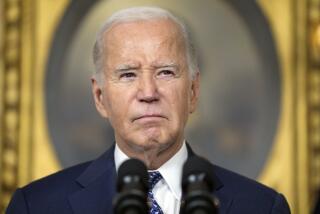How Mitt Romney should have answered the bullying story
- Share via
The Washington Post’s piece Thursday about the rough pranks former Massachusetts Gov. Mitt Romney allegedly pulled in prep school added little, if anything, of substance to the presidential race. It was cast as a sort of reality check on the Romney campaign, which has been trying to humanize the candidate by talking about his puckish streak. But it only makes me wonder whether similar scrutiny was applied to President Obama’s teenage years, and why anyone would think that portion of the candidates’ lengthy biographies would be relevant to the choice confronting voters in November.
Nevertheless, Romney’s response was lame, sounding more like boilerplate scripted by the campaign team than a heartfelt expression. Note to anyone in a similar situation: sincere regret is not expressed in the subjunctive.
During an interview with Fox News Radio, Romney offered three variations of the same response:
“Back in high school, you know, I did some dumb things. And if anyone was hurt by that or offended, why, obviously I apologize.... As to the pranks that were played back then, I don’t remember them all, but again, you know, high school days, if I did stupid things, again, I’ve got to say sorry for it.... If there’s anything I said that was offensive to someone, I certainly am sorry about that. Very deeply sorry about that. But no harm intended.”
I don’t remember much about what I did when I was that age either, and I’m a mere 35 years past my high school graduation. So it’s not a stretch to think that Romney has no memory of the alleged bullying.
The problem is, the Post found five witnesses to one particularly ugly incident in which Romney purportedly led a group of boys in holding down a younger, effeminate student and hacking off some of his bleached-blond hair. It was the roughest of several edgy pranks that the Post documented, and the participants that the Post interviewed said they were still troubled by it.
Every candidate faces this kind of problem at some point: either the media or opposing candidates (who, let’s face it, are skilled at using the media to deliver their attacks) will come up with one or more foul-smelling chestnuts from the candidate’s past. And typically, the candidate will do what Romney did: issue a non-apology apology that says, “My intentions were good, but if anyone took offense, then I’m sorry.”
In other words, there’s no admission of wrongdoing, nor any acknowledgment that the behavior is inherently objectionable. It’s a subtle way of suggesting that the people who took offense are the ones who have the problem.
And yet, what’s a candidate to do if he or she honestly doesn’t remember the incident(s) in question? How can you apologize for something you don’t think you did?
The right choice is either to take ownership of the incident and apologize for it, or say you don’t have any memory of it and argue that it’s not representative of who you are today. The whole “if I offended anyone, then I apologize” construct is a have-it-both-ways middle ground, maintaining some of the denial while also trying to sound sympathetic to those who complained.
Romney’s campaign spokeswoman, Andrea Saul, had a better answer than her boss did, although she was perhaps too aggressive in challenging the allegations. “Anyone who knows Mitt Romney knows that he doesn’t have a mean-spirited bone in his body,” she told the Post. “The stories of 50 years ago seem exaggerated and off base and Gov. Romney has no memory of participating in these incidents.”
It would have been enough for her to say that Romney has no memory of the incidents, and that the allegations are hard to reconcile with the man who’s been in the public eye for close to 20 years. After all, Romney’s right: there are far more important things for us to be talking about in this campaign. I’m not defending bullying -- far from it. I’m just saying that what people do in their teens isn’t a good measure of who they are as adults. President Obama is no more eager for such scrutiny than Romney is.
No doubt the coming campaign will prompt journalists to revisit just about every aspect of Romney’s biography -- the years he spent on Mormon mission in France, his work at the corporate takeover firm Bain Capital, his leadership of the Winter Olympics in Salt Lake, his tenure as governor of Massachusetts. It’s part of the process of vetting a presidential candidate. And no doubt, there will be more times when Romney will be called on to either refute or apologize. Here’s hoping that next time his response won’t be subjunctive.
ALSO:
When American narratives collide
Lugar wasn’t just an ‘out of touch’ centrist; he was 80
More to Read
A cure for the common opinion
Get thought-provoking perspectives with our weekly newsletter.
You may occasionally receive promotional content from the Los Angeles Times.







